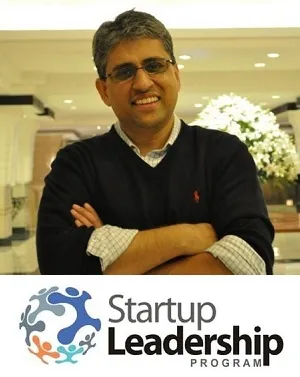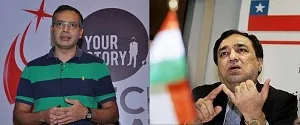Common Mistakes Entrepreneurs Make and How to Avoid Them– With Anupendra Sharma, Founder, SLP
Mistakes are a part and parcel of an entrepreneurs life, or for that matter, anyone's life. But from an entrepreneurs point of view, committing new mistakes each time and learning from them is important. Anupendra Sharma, the founder of Startup Leadership Program went through this cycle as well and having graduated over 800 SLP fellows in past 7 years, he definitely has a lot to share from his experiences. Being an investor adds to his bucket of viewpoints & opinions.

There are always few common mistakes which an entrepreneur makes, irrespective of his product, location or market. Anupendra shared, “There’s a whole laundry list of mistakes which early stage entrepreneurs should avoid and speaking of the most crucial ones in my observations, following appears on the top of my head”:
1. Entrepreneurs do not have tough discussions with their co-founders in the beginning. These should take care of all ‘what if’ cases. In India especially, there’s never any agreement signed on paper. There should be an understanding on who’ll take the final call, which one will leave the job first in their early days and so on. This is most commonly observed with the first time entrepreneurs as they haven’t worked together to have enough understanding.
2. Innovators with ideas to solve a certain problem might not have even experienced the problem itself and the solution they come up with become nothing more than noise to the customer. Though the beauty of not understanding a domain and trying to solve a problem is that when you don’t know the rules, you’ll put in more innovative methods. But there have been cases where entrepreneurs have raised money without even realizing if it’s going to work or not and hence they need to spend time with the customers. Even the VCs have mostly seen multiple solutions to the same problem, given their domain expertise and going through these innovations across the sector is an advantage they have over entrepreneurs.
3. People universally forget about the advise, support, mentorship they have received in their entrepreneurial journey. One should prepare an excel and populate it with the names of the people they have bounced off their ideas with. One of the ill-effects of not practicing this exercise is that the mentors who advised you correctly will never come to know about their potential and will not make a good mentor. These people can be a part of your founding board down the line, or the one whose help you seek in case of confusions. In any case, you can rely on them being your well-wisher; only if you respond to them the very first time your idea took shape.
4. Anupendra goes on to advise the young product builders. “Try to find ways to monetize the engagement with the very first user of your product. Not only this, the whole experience should be free from any friction in doing business in the system. E.g. One of the player in the rental car market in US offers services in airport wherein the user can get into in to any parked car by showing his/her credit card and D/L. That’s it and you drive away a $50000 product hassle free. The simpler the product the better adaptability a user will have to it.”
What SLP has taught Anupendra?
Recalling his last 7 years Anupendra spoke, “I’ve had humungous amount of learning at SLP. In fact, to quite an extent this experience has made me a better investor. Some have come easier and few took the hard way but nevertheless all have contributed to who I’m today :

1. Being a part of SLP gives me the access to see the picture from the other side as well. This hard side of entrepreneurship with people asking for money develops the sensibility in you.
2. I’ve come across many co-founder conflicts and have been surprised by their rampant nature.
3. It’s in the DNA of all entrepreneurs to chase their dreams without caring about funds. I met an entrepreneur in Tel Aviv who had borrowed money to buy jacket & shoes to come to the SLP gathering in the bar. He said that he couldn’t afford going to such a place in last one year as he’s cash strapped. There’s no space to show off and unnecessary spending in entrepreneurship and we follow the same at SLP.
Beyond the SLP program, Anupendra goes on mentioning his other learning & advises to the startups looking to raise funds:
a) A CEO should be aware of his responsibilities. His job is to keep the lights of the company on. He has to make sure that the company is running in return of the trust of all employees. For him fundraising and getting customers should be a priority and everything else should take a back seat.
b) It’s extremely easy to do the background check of a person in this connected era. Hence, it’s important for an entrepreneur to be conscious about his reputation in the industry because that might be one of the deciding factors while raising money.
Opinion on the US v/s India market

Anupendra accepts his second-hand knowledge in this regard and restricts himself to share only a couple of observations:i) VCs in India are very much global as the startups they invest cater to global audience many a times. Also, they are okay with the founder moving to US with his startup. They resemble Israeli investors in this regard. The case in different in US & China where most of the products have local market as reference point which explains the local mindset of investors here.
ii) India is a smaller exit market as compared to US. When an innovative product is built in India it faces bigger adoption concerns. Even today, Indian ecosystem is not exposed to the product technology innovations and hence the players in this sector fear a higher risk and a lower possibility to prosper.
Apparently, from an entrepreneur’s point of view funding is in short everywhere.
Poster boys of Indian Startup Ecosystem

Anupendra believes that Deep Kalra & Rajesh Hukku stand apart from the crowd when it comes to the true leaders of Indian startup ecosystem as explained below:a) MakeMyTrip has put India in a global map. Deep went through tough times in year 2000 when they were raising funding but his mind & heart was at right place and that has truly defined his success today.
b) Rajesh Hukku, a BITS Pilani alumnus has transformed I-flex Solutions (now Oracle Financial Services Software) into a global software product company. He’s the kind of leader one should aspire to be.
As the famous American businessman Harold Geneen has said, “Leadership cannot really be taught, it can only be learned”, Anupendra is hopeful that the coming batches of SLP will do justice to his vision.
If you’re an entrepreneur, innovator or a leader, you can apply now for the next batch of SLP.







